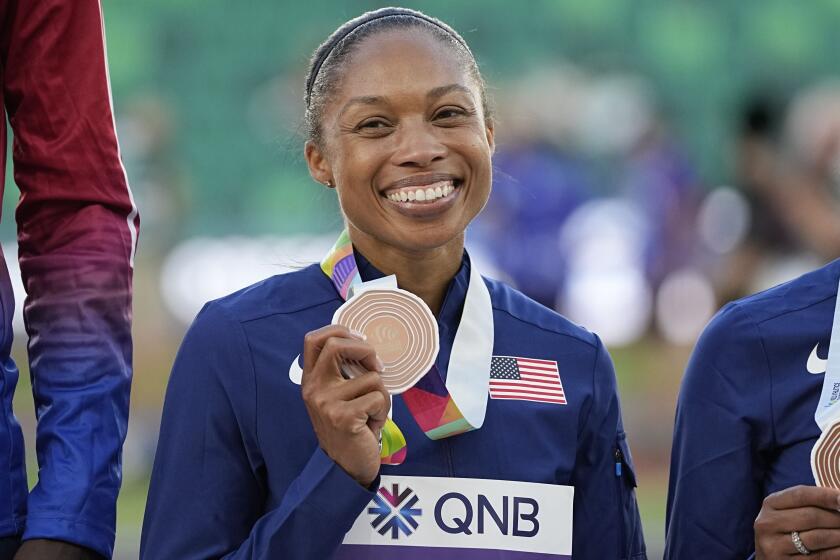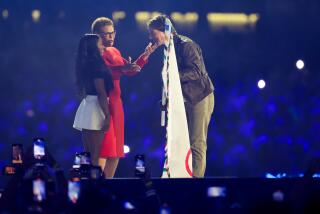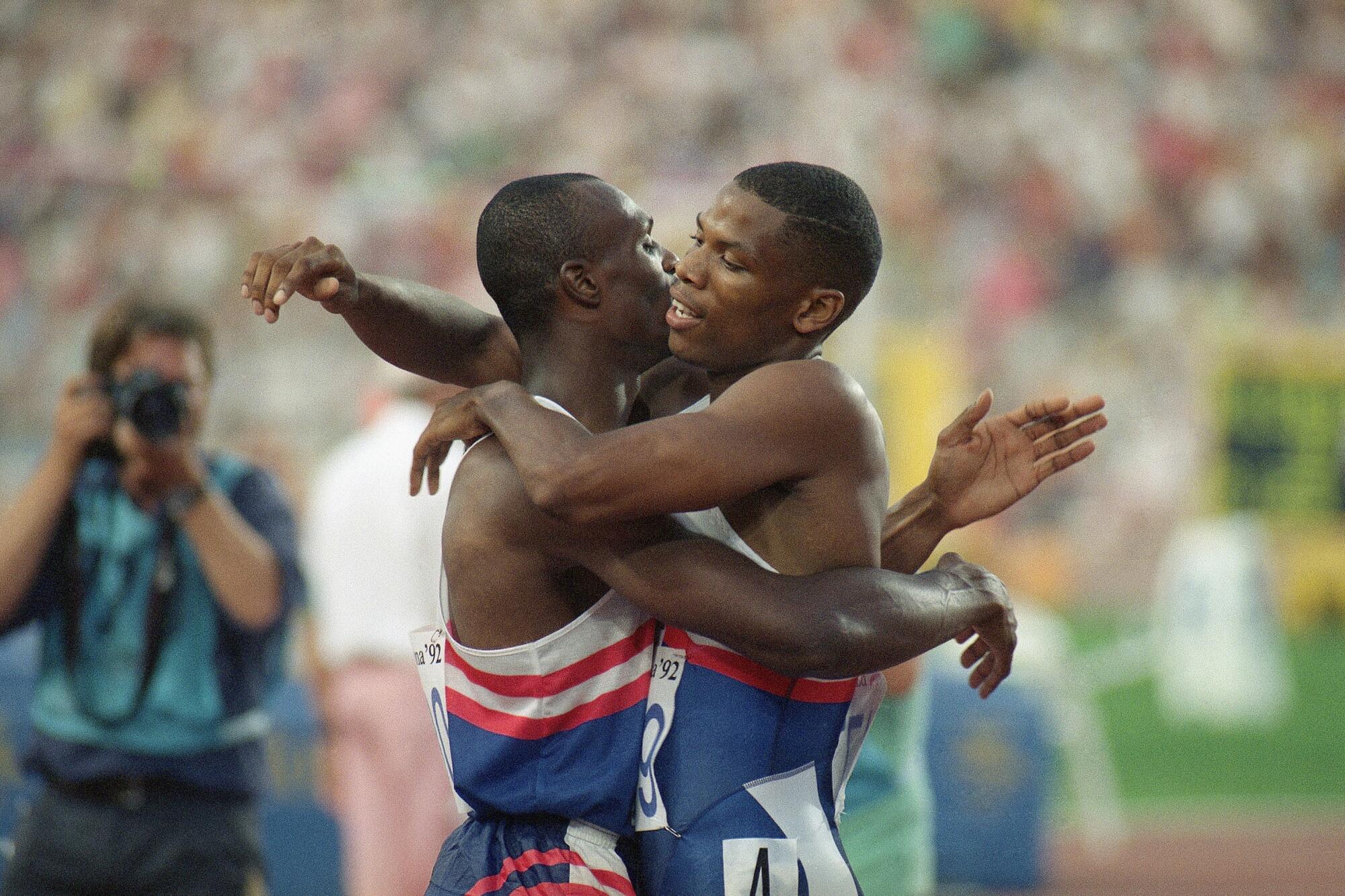
- Share via
The following is an excerpt of a story about Quincy Watts and Kevin Young, their L.A. roots and rising to track and field fame 30 years ago.
Had it been up to Olympic champion and former world record holder Kevin Young, he would have spent the night of Aug. 6 chilling with his wife, Marion Laeuppi, and three teenage stepchildren at an Airbnb in Inglewood they recently rented.
But thanks to Marion and a friend, the evening was an intimate celebration of a magical moment 30 years ago this month when he and two fellow Los Angeles City Section alumni stood atop the track and field world.
Three decades ago Young became the first man to break 47 seconds in the men’s 400-meter intermediate hurdles in the 1992 Olympic Games in Barcelona in a world-record time that would stand for nearly 29 years.
Allyson Felix, the most decorated sprinter in U.S. history, is closing out her prolific career by running in the Race for Change charity event.
“I was willing to let the day go by without making a big deal of it,” said Young, a UCLA graduate who now lives in a village outside of Zurich, Switzerland. “But I’m glad it came together. That was the first time Q and I had done anything together in regards to Barcelona.”
Q is Quincy Watts, now the director of men’s and women’s track and field and women’s cross-country at USC, his alma mater. In Barcelona, Watts set a pair of Olympic records in the men’s 400 meters, capped by a career best that was the second-fastest performance in history.
Young and Watts had not seen each other for several years until Watts gave Young and his children a tour of facilities at USC a few days before the surprise party at the rental house.
Steve Lewis, the 1988 Olympic champion in the 400 who placed second to Watts in ’92, and Johnny Gray, the ’92 bronze medalist in the 800, were the first guests to arrive.
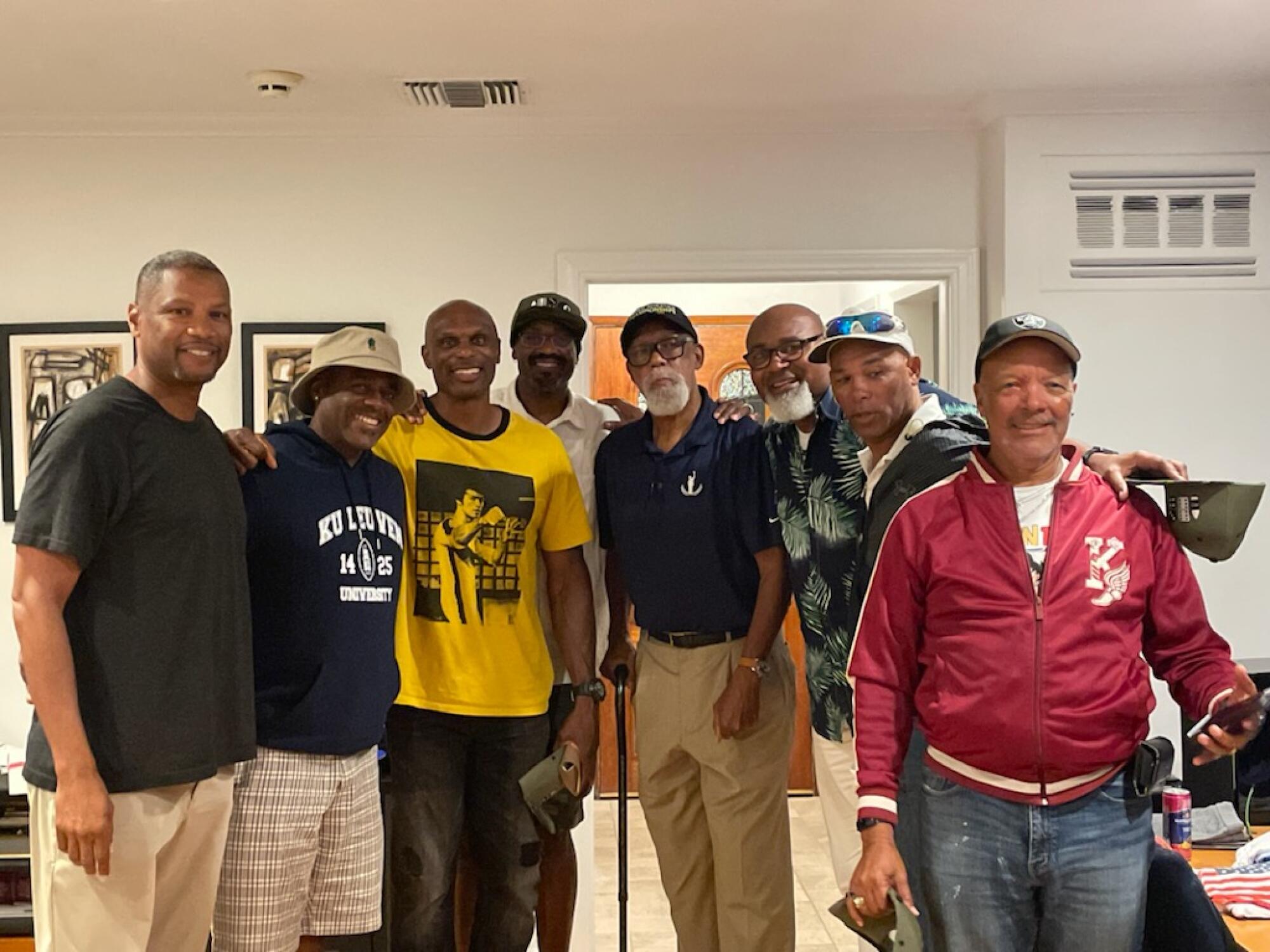
Next were Derek Knight, a college teammate of Young’s who helped Marion put the party together, and John Carlos, the 1968 Olympic bronze medalist in the 200 and the man who will forever be remembered — along with gold-medalist Tommie Smith — for raising a black-gloved fist during the awards ceremony in Mexico City to protest racism against Black Americans in the U.S.
Then came Eugene Driver a former masters sprinter, Jeff Williams, a bronze medalist in the 200 in the 1995 World Championships, and Watts, who won a second gold medal in the ’92 Games by running a scorching second leg in the 1,600 relay to help the U.S. to a then-world record clocking.
“We talked about a lot of things and told a lot of stories,” Young said. “As the wine got poured, the conversations started getting longer and louder.”
The story of how Young, Watts and their coach, John Smith — all three products of the City Section — achieved Olympic greatness does not follow a straight line.
Young grew up playing basketball on a playground in the Watts neighborhood of South Los Angeles.
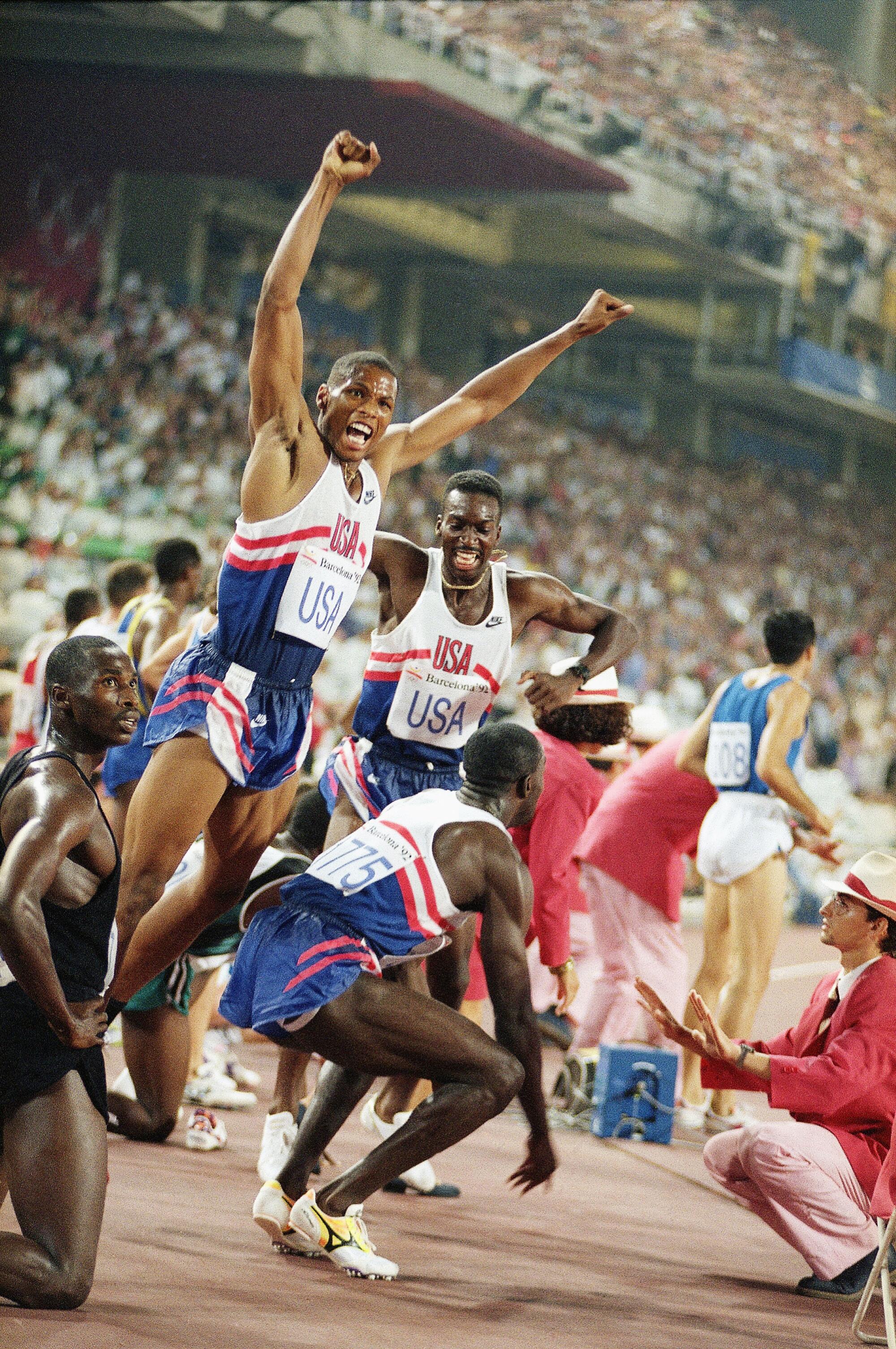
As the youngest of seven children, he credits a “sixth sense” he had for avoiding the trouble that engulfed some kids around him, including an older sister, Carmen, who died in 1990 after being addicted to PCP for many years.
Young had a solid track career at Los Angeles Jordan High School, finishing third in the 110-meter high hurdles in the state championships as a senior in 1984. With no scholarship, he walked on to the UCLA team and changed events for fear of being cut.
“I took up the intermediate hurdles in earnest as a sophomore because we had a lot of good high hurdlers and I wanted to make the team,” Young said.
After a second-place finish in the NCAA championships that year, Young won titles in 1987 and ’88, and placed fourth in the 1988 Olympics in Seoul. Ranked among the top six performers in the world by Track & Field News from 1987-91, he was undefeated in 1992 entering the Olympic Games.
Meanwhile, the basketball-loving Watts had never run track before his mother in Detroit sent the eighth-grader to live with his father in the San Fernando Valley. He would go on to win three state titles — and finish second twice — during his career at Woodland Hills Taft High.
He missed much of his senior season with a strained right hamstring, and injuries slowed him at USC through the first part of his junior track season. Being sidelined even sent him dabbling in football as he sought camaraderie.
“Track and field is a team sport, but when you’re hurt on the sidelines it’s lonely,” he said. “It’s pretty lonely and frustrating when you’re hurt, year after year.”

In 2012, Quincy Watts reflected on his Olympic gold-medal triumph.
The hamstring issues led Watts to focus on the 400 as a junior and he placed second in the 1991 NCAA Championships before winning the ’92 title and finishing third in the Olympic Trials.
Watts’ quest for a gold medal in Barcelona began with a win of his first-round qualifying heat. But he felt “out of rhythm” while finishing second in his quarterfinal in 45.06.
Smith, who first coached Young at UCLA and began working with Watts in the summer of 1991, blamed Watts’ sunglasses slipping off when he came out of the blocks.
After the race Smith asked for the sunglasses, which he threw down and crushed. Then he told Watts to send a message by dominating his semifinal, and he did: His 43.71 clocking lowered the Olympic record of 43.86 set by American Lee Evans in 1968 and was the second fastest in history despite him easing up over the last 20 to 25 meters of the race.
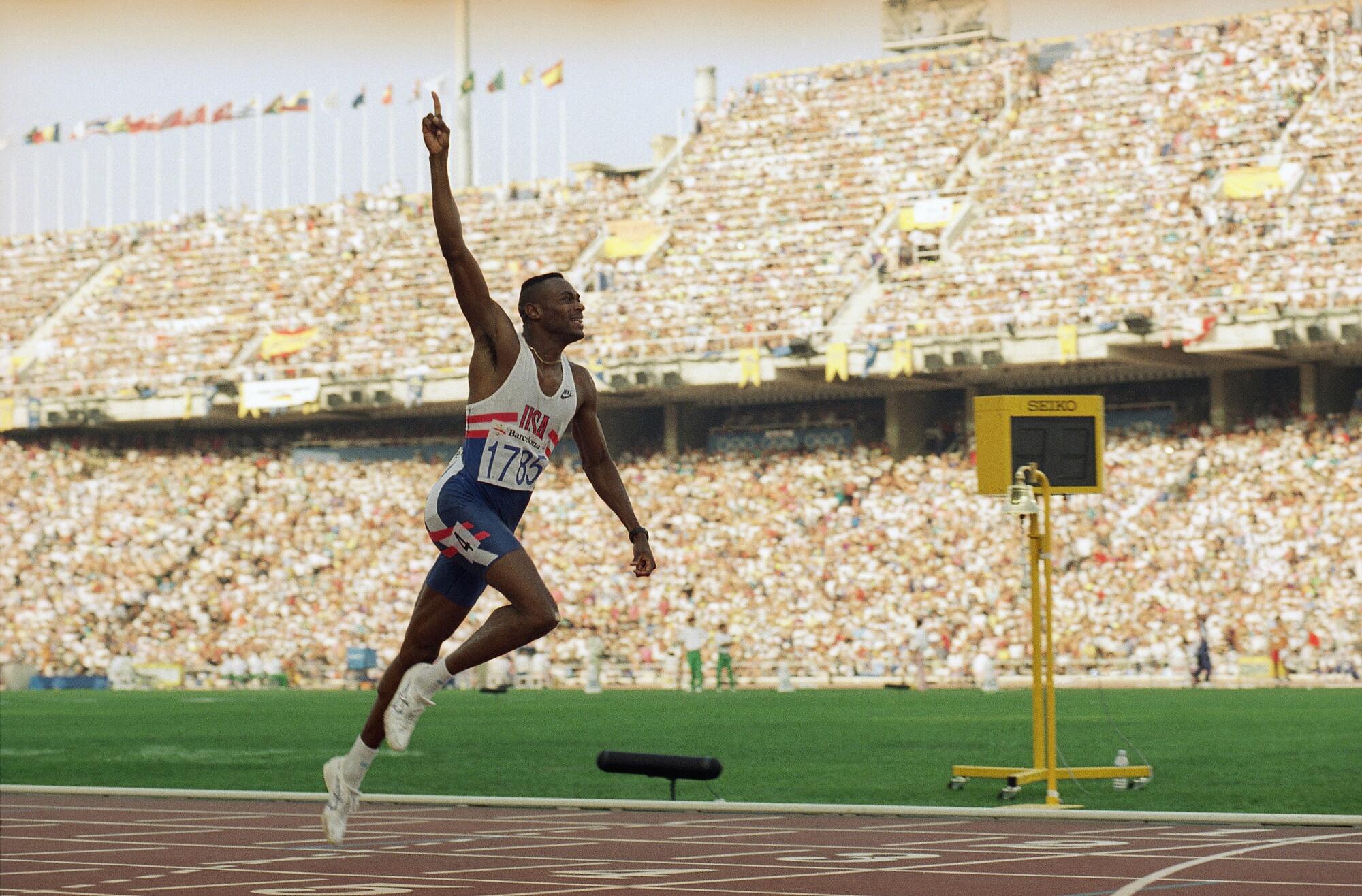
Two days later in the 400 final, Watts trailed out of the first turn behind former UCLA standout Lewis, but he made up ground down the backstretch to gain a four- to five-meter advantage over his closest pursuer entering the home straightaway.
“I knew I had the race won coming out of the turn, but I wasn’t going to take any chances,” Watts said. “With about 50 meters to go. . . I went to muscle it. I wanted to give it everything I had and my form kind of went out the window. I just let it all out because I had the great Steve Lewis in the race and I wasn’t gonna look back.”
Watts’ time of 43.50 was second only to American Butch Reynolds’ world record of 43.29 from 1988, and his margin of victory over Lewis (44.21) was the largest in the Olympics since 1924.
The win was a wonderful gift for Smith on his 42nd birthday, and Young gave him “something even better” the next evening in the final of the intermediate hurdles.

Jamaican Winthrop Graham and Frenchman Stephane Diagana led through the first hurdle or two of the 10 flights of barriers. But Young was clearly in the lead after the fifth hurdle and was so far ahead near the end of the home straightaway that he raised his right arm in triumph eight meters before the finish line.
His time of 46.78 broke American Edwin Moses’ 47.02 world record from 1983 and left him well clear of Graham in second (47.66).
“I was super, super happy,” Young said. “I felt like I had accomplished a lot coming from where I came from. Having grown up in Watts, having been a walk-on at UCLA, having taken up the intermediate hurdles at UCLA because I wanted to make sure I made the team.”
Though Watts would help the U.S. set a world record of 2:55.74 in the 1,600 relay in Barcelona, he and Young would forever be linked by their victorious performances in the 400 and intermediate hurdles.
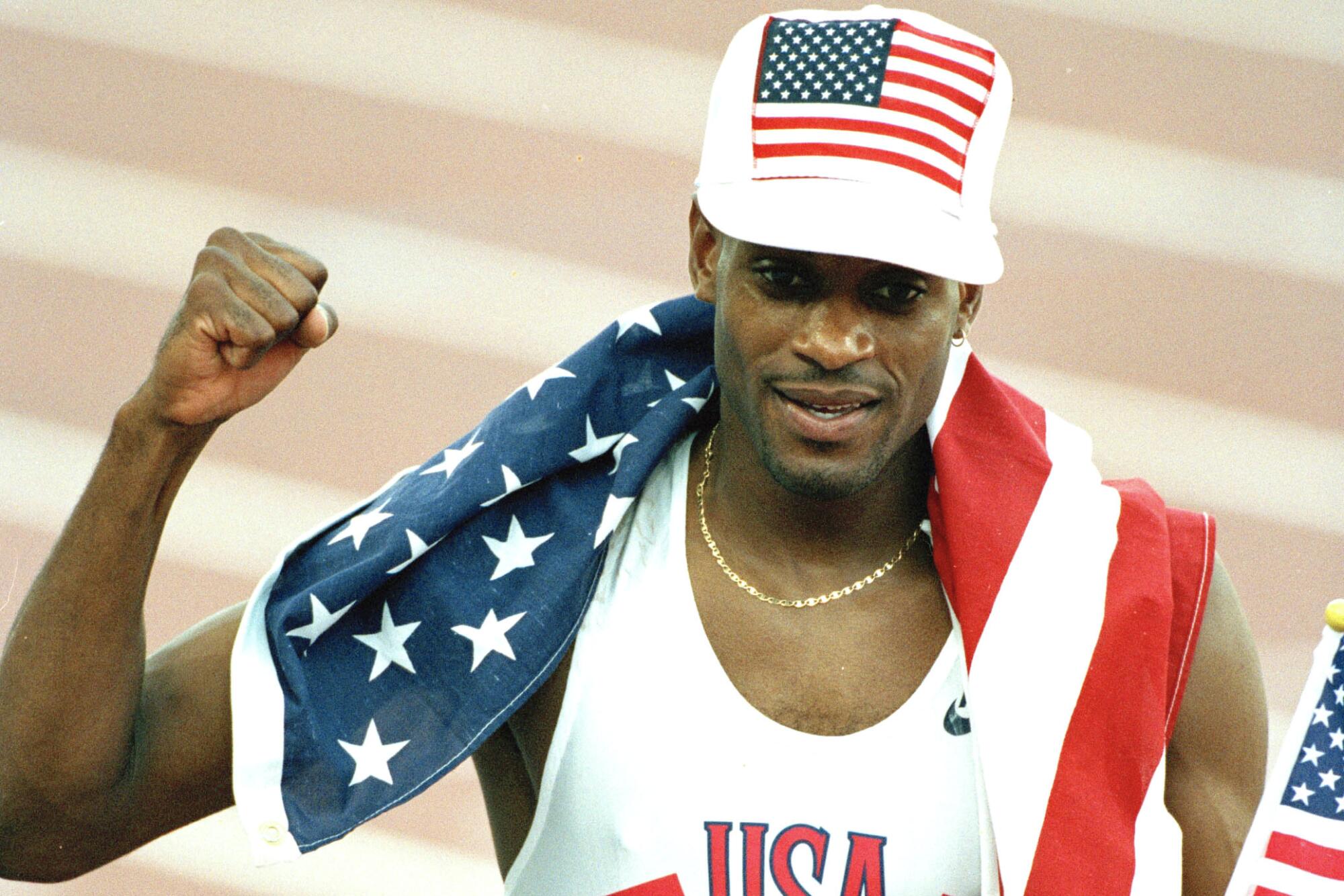
Young won the World Championships in Stuttgart, Germany, in 1993 and Watts ran a leg on a 1,600 relay team that set a still-standing world record of 2:54.29 in that meet. But they split with Smith after the 1993 season and their performances tailed off after that.
Smith, a 1968 graduate of Los Angeles Fremont High and the No. 1-ranked quarter-miler in the world in 1971 as a UCLA junior, has coached a slew of elite sprinters. But he doesn’t fret about what could have been.
“I look back at what we accomplished together. I mean, Quincy set a pair of Olympic records in the 400 and won a pair of gold medals. And Kevin won a gold medal and ran a time that stood as the world record until last year. We all had pride in what we did.”
John Ortega is a former Los Angeles Times sportswriter who now writes Track & Field Informed (TFI) with Johnny O at trackandfield.substack.com.
More to Read
Go beyond the scoreboard
Get the latest on L.A.'s teams in the daily Sports Report newsletter.
You may occasionally receive promotional content from the Los Angeles Times.
